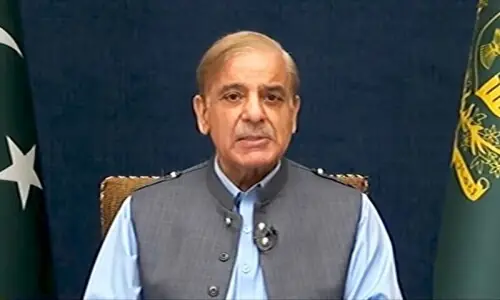The year 2013 promises to be a big year for Pakistani folk and Sufi singer Sanam Marvi. All set to launch her second album (a compilation of Sufi songs) in India, she is also gearing up to participate in music festivals in Japan, the US, Canada and France where she is quite popular and has been invited for the third consecutive year.
“Sufi lyrics have a universal and timeless appeal,” Sanam shrugs modestly. “People find comfort in the compositions of Baba Bulleh Shah, Sachal Sarmast, Shah Abdul Latif Bhittai and Baba Sheikh Farid.”
Does she have any plans to expand her repertoire and explore pop music?
“I haven’t given much thought to it, but I might consider it if I really like the lyrics and music. I made my debut in playback singing last year with London, Paris, New York. I’ve also recorded for another Bollywood film and Ishq Khuda, a Pakistani film slated for release around Eid-ul-Fitr.”
Sanam has just returned home after an electrifying performance at the 19th edition of the Fes Festival of World Sacred Music in Morocco. The festival brought together artists of the calibre of Archie Shepp (jazz/blues), Ravi Shankar and Youssou N’Dour, and was attended by music connoisseurs from around the globe.
“I performed there in 2012 as well,” says Sanam, who has a distinctive style and sings primarily in Urdu, Sindhi and Seraiki dialects. “It’s an honour for me that they invited me again this year.”
The city of Fes el Bali has clearly touched Sanam Marvi’s heart. She avers, “I loved being there. Fes is more than 1,200 years old and there is so much history there. In some ways, it reminded me of Multan with its ancient mosques and shrines, colourful streets and small shops. I felt as if I had stepped back in time.”
“Sufi music is my first love but I started off by learning classical singing,” she continues. Her father, Faqeer Ghulam Rasool, is a local Sufi singer and as a child she would often accompany him to his performances at various shrines in Pakistan.
“I started singing when I was four,” she says. Her inherent talent caught the eye of the maestros early on, and she came under the tutelage of Ustad Majid Khan and Ustad Ali Nawaz Khan when she was seven.
“I also had the good fortune to learn from Ustad Fateh Ali Khan of the Gwalior gharana for two years,” she adds.
“A strong foundation in classical singing has helped me tremendously, it has given me a good base to build up on,” she muses. “I can sing classical and semi-classical with relative ease and can experiment with variations in vocals. I am more drawn towards Sufi kalam and I’m deeply inspired by my father.”
Apart from her father, Sanam Marvi holds Mian Yousaf Sallahuddin of Lahore in high esteem and regards him as a paternal figure. “He is like my baba,” she says. She made her debut in 2009 on Virsa Heritage, a music programme on PTV, where her performance garnered much appreciation.
“It was Mian Yousaf Sallahuddin who introduced me,” she reminisces. “I was an unknown singer back then and it was a miracle that he gave me the opportunity to perform at such a gathering. I owe my success to him.”
Her appearance on the third season of Coke Studio (2010) catapulted her into the limelight and made her a household name. “I was approached for CS after the success of Virsa Heritage. I was apprehensive about performing on such a huge forum because I thought I wouldn’t be able to meet people’s expectations. But Mian Yousaf Sallahuddin insisted that I must appear on the show and I took his advice.”
The public’s wonderful response instilled a great deal of confidence in Sanam and spurred her on to return for CS Seasons 4 and 5. “It has been an amazing experience working with Rohail Hyatt and the house band. One artist I particularly enjoyed working with was Sajjad Ali.”
Sanam Marvi’s soulful rendition of Ith Naheen on Season 4 resonated so well with the audience that it made its way to the iPod lists of many teenagers as well, an indication of the rising popularity of Sufi music. Embracing the spiritual poetry of Sachal Sarmast, Ith Naheen brought Sanam Marvi’s depth and range of vocals to the fore and established her as one of the finest singers in the Sufi genre.
Her widespread acclaim led to an invitation to perform at Jahan-i-Khusrau, a Sufi music festival organised annually in Arab ki Sarai by Raja Muzaffar Ali of Kotwara. “It was a great experience,” she says animatedly as she talks of the serene ambience at Arab ki Sarai. “The crowd there is terrific. And of course, I received tremendous respect; Raja Muzaffar Ali treated me like his daughter.”
In February 2011, Sanam performed with Indian playback singer Rekha Bhardwaj at Times of India’s Aman ki Asha in Hyderabad. Her eyes light up as she tells me about the time she was invited by Dr. Kirat Sindhu to perform at Pul Kanjri near Amristar. “I love going to places that are seeped in history,” she says, referring to the legend of the bridge built by Maharaja Ranjit Singh.
She says she is not an ambitious soul and her priority in life remains her close-knit family. Had her talent for singing not been harnessed she would have “chosen to remain a housewife”. And although she is quite disciplined about her training, she doesn’t let it overwhelm her life. “I rehearse daily on my own for just half an hour, and once a week with a team of musicians.”
I ask her if she thinks all the media attention and glitziness encroaches upon her privacy. “I don’t find it difficult to deal with,” she reflects. “I am grateful for my fans and their support. That said, I love solitude and quiet, and prefer to spend time with my family and close friends.” Married to Hamid Ali Khan, she has three children and says she is “happiest when I’m with my family.”
When the noise gets too much, she escapes to one of her three favourite places: “I find myself going to Bibi Pak Daman, Uch Sharif and Baba Bulleh Shah’s mausoleum; there is an air of profound serenity in these places and I’m drawn to them time and time again. I feel healed and whole when I am there.”
I ask Sanam what she thinks about the recent upsurge in the popularity of Sufi music. “It’s only natural,” she reflects. “Our lives have become so fast-paced that people feel an emptiness within and are in the quest for inner peace. Sufi music is soothing and there is much solace to be found in the meaningful lyrics.”






























